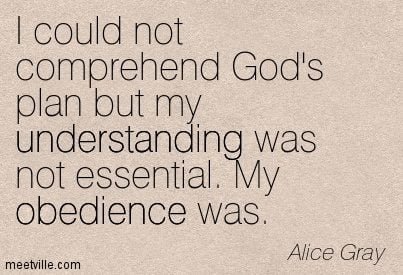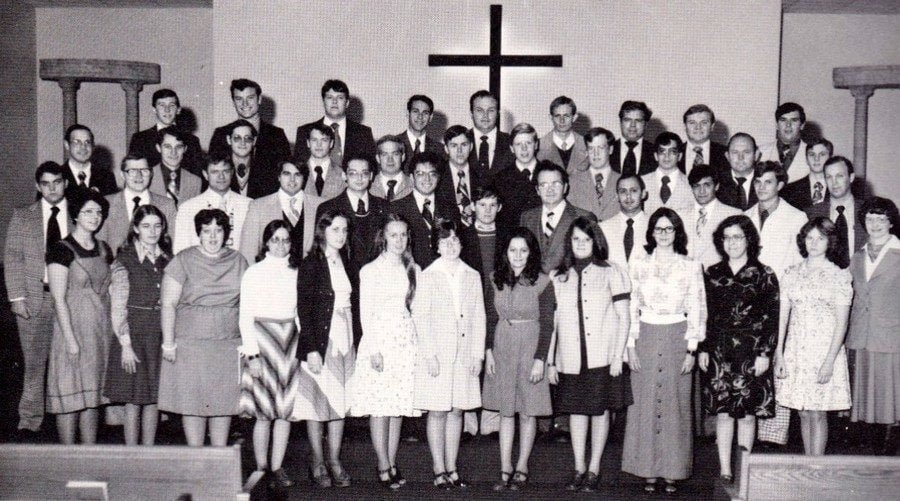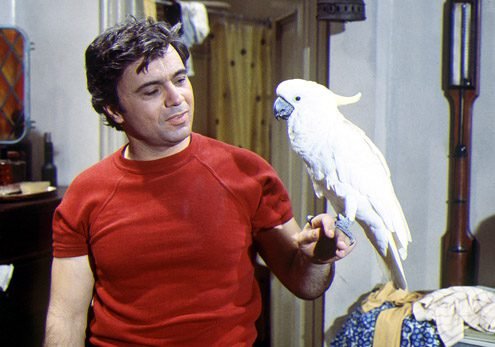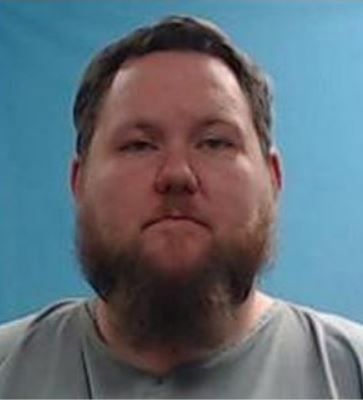
And Samuel said (to Saul), Hath the Lord as great delight in burnt offerings and sacrifices, as in obeying the voice of the Lord? Behold, to obey is better than sacrifice, and to hearken than the fat of rams. For rebellion is as the sin of witchcraft, and stubbornness is as iniquity and idolatry. Because thou hast rejected the word of the Lord, he hath also rejected thee from being king. (I Samuel 15:22,23)
Then Peter and the other apostles answered and said, We ought to obey God rather than men. (Acts 5:29)
Like all despots, dictators, and potentates, the Christian God demands his followers implicitly and explicitly obey him. When he says, JUMP, the only proper response is, HOW HIGH? The Christian God has no tolerance for those who dare to disobey him. Doubts, questions, or concerns are not permitted. John Sammis’ nineteenth-century hymn Trust and Obey says: Trust and obey, for there’s no other way To be happy in Jesus, but to trust and obey.
Those of us raised in Evangelical churches know all about obedience. Obey God. Obey your parents. Obey pastors. Obey adults. Later in life, women are told that not only must they obey God and their pastors, they must also obey their husbands. As with all cults. obedience is the key to a compliant, easily manipulated group. Jim Jones, once an ardent Evangelical, commanded his followers to drink cyanide-laced Kool-Aid, resulting in the death of over 900 people — including 304 children. Evangelical pastors and Catholic priests sodomize, rape, and molest children who have been taught from a young age to implicitly obey them. Trust me, I am a pastor, are words that have caused incalculable harm to young and old alike. Taught to be blindly obedient, these Christian sheep obey the commands of their shepherds. Once robbed of the capacity to think and reason, church members are easy prey for predator pastors and priests.
Of greater concern is the belief that God directly speaks to Evangelicals. Pastors routinely tell congregants that God spoke to them and told them to do ______________. Church members, supposedly indwelt by the Holy Spirit, believe God directly speaks to them with an inaudible, small voice (I Kings 19:11-13). According to the New Testament, the Holy Spirit is given to Christians to be their teacher, voice, and guide:
But the Comforter, which is the Holy Ghost, whom the Father will send in my name, he shall teach you all things, and bring all things to your remembrance, whatsoever I have said unto you. (John 14:26)
But when they deliver you (the disciples) up, take no thought how or what ye shall speak: for it shall be given you in that same hour what ye shall speak. For it is not ye that speak, but the Spirit of your Father which speaketh in you. (Matthew 10:19,20)
Which things also we speak, not in the words which man’s wisdom teacheth, but which the Holy Ghost teacheth; comparing spiritual things with spiritual. (I Corinthians 2:13)
But the anointing which ye have received of him abideth in you, and ye need not that any man teach you: but as the same anointing teacheth you of all things, and is truth, and is no lie, and even as it hath taught you, ye shall abide in him. (I John 2:27)
According as his (God) divine power hath given unto us all things that pertain unto life and godliness, (2 Peter 1:3a)
Consider, for a moment, that millions and millions of Americans believe that God lives inside of them and directly talks to them. This should scare us, especially considering that many elected government officials think God talks to them. Do we really want a president who hears voices in his head, thinking it is the Christian God telling him what to do? What if God tells him to launch a nuclear strike on China or Russia? Should Christians such as this be anywhere near the nuclear football?
Several years ago, Randall Murphree, editor for the American Family Association Journal, perfectly illustrated the mind-numbing, reason-killing obedience the Christian God expects from his followers. Murphree recently took a trip to Kentucky to see Ken Ham’s monument to ignorance, Ark Encounter. Reflecting on his visit to the Ark Park, Murphree wrote:
Answers in Genesis (noted for its Creation Museum in northern Kentucky) is building a full-scale replica of Noah’s Ark in Williamstown, Kentucky, about 30 miles south of Cincinnati. I was blessed to tag along a few days ago when AiG hosted a media tour of the Ark under construction. Wow!
We think we can imagine what it would look like, but to walk up to it in real life took my breath away – 510 feet long (more than a football field and a half), 51 feet high (4-5 stories).
AiG cofounder Ken Ham led our tour, taking us through the four levels and to the top deck, explaining how Noah could realistically have cared for two of each kind of animal on the Ark, pointing out interior framework and structure that will house 132 exhibits lining the long walkways, explaining that animals on the Ark itself will be realistic sculptures but a petting zoo will adjoin the Ark property. And there’s so much more to anticipate.
….
As exciting and stimulating as the Ark was, I began to decompress on the long drive home. An unlikely metaphor came to mind – extreme sports, those over-the-top, beyond-reason, insane physical challenges people are tackling these days.
Extreme! Now, Noah was really into the extreme – extreme obedience! I thought. What he did was impossible for man. But God gave him specific directions, and Noah obeyed, giving himself fully to the calling…
….
Unexpectedly I was suddenly doing some real soul searching, taking a little inventory, and considering God’s direction in my life. Sometimes I think He calls me to a task too great. How often have I not been obedient? My little Ark encounter humbles me and challenges to listen more carefully for God’s voice and be ready to demonstrate – as Noah did – extreme obedience.
Murphree says that God demands EXTREME OBEDIENCE! If God tells you to go into the desert and build a huge boat, do it! If God tells you to murder your only son, do it! If God tells you to move to Africa and be a missionary, do it! If God tells you to give all your money to the church or a TV preacher, do it! If God tells you to pitch a tent in your backyard and fast and pray for 40 days, do it! Whatever it is that God tells you to do, DO IT! Any doubt or hesitation is a sin, an affront to the God who holds the keys to life and death in his hands.

Evangelicals are frequently reminded that God only wants what is good/best for them. So whatever God commands, he means it for their good. God is good all the time, all the time God is good say Evangelicals. Since God is the pillar of moral purity and virtue, Evangelicals can trust him when he tells them to do _____________. According to the Biblical passage mentioned above, God isn’t interested in sacrifice (religious works). All God wants is for those who worship him to obey his commands. And not just the commands found in the Bible. God can, and does, command Evangelicals to do things that seem crazy to unbelievers. Better to be viewed as crazy than disobey God.
Remove religion from this story and hearing voices in one’s head would be viewed as a sign of mental illness. But because it involves religion, we are supposed to uncritically accept that Evangelicals do what they do because God told them to. Having spent most of my adult life in Evangelicalism, I intimately understand the notion that God “talks” to Christians. God talked to me many times, telling me whom to marry, where to live, what churches to pastor, and whether I should buy something or give money to a religious cause. For five decades, I believed God lived inside of me. I believed God and I were the best of buds. I would pray (talk) to God and he would often respond. When I needed to know what to preach or what direction to lead the church, I always asked God to tell me what I should do. And guess what? God, ever the chatterbox, never failed to tell me exactly what he wanted me to do.
I now know, of course, that the voice in my head was my own. The God who was talking to me had red hair and his name was Bruce Gerencser. (Please see A Few Thoughts on a Lifetime of Praying to the Christian God.) No big deal right, right? Who cares if Evangelicals think God talks to them? No harm, no foul, right? I used to think so, but as I continue to write about my past life as a soldier for the Christian God, I now think otherwise. I now see how believing God talked (leading, directing, showing, moving) to me hurt not only me, but my family. Instead of being proactive and acting as a reasonable, rational adult would, I allowed the voice in my head to keep me from acting responsibly. From selling family heirlooms and collectibles so I could use the money to “help” someone, to living in abject poverty so I could “minister” to God’s people, I know firsthand how “listening” to the voice of God can cause untold heartache and loss.
Every month or so, we hear of stories about someone who killed or severely hurt themselves or others, all because God “told” them to do it. Several years ago, a Muslim woman cut the head off a child because Allah told her to do so. I am sure Evangelicals saw this as an example of what happens when someone listens to the wrong God. However, there are plenty of stories about Evangelicals hearing the voice of God and doing things such as drowning their children, gouging out their eyes, cutting off their penis, or making the top 12 on American Idol or The Voice. I put “God told me to do it” in the search box on Huffington Post and it returned stories such as Teacher Says ‘Higher Power’ Told Him To Attack Kid With Skateboard; Mom Allegedly Tries To Drown Son In Puddle Because Jesus Told Her To; Man Allegedly Stabs Grandma, Blames Archangel Michael; Nurse Thinks Grandmother Was Possessed, Beats Her To Death; Jesus And Mary Told Me To Kill Him Because He Is Satan’s Spawn!

Jack Schaap, an Independent Fundamentalist Baptist (IFB) megachurch pastor who is now serving a twelve-year federal prison sentence for having an illicit sexual relationship with a minor girl in his church, told his young lover, “This is exactly what Christ desires. He wants to marry us + become eternal lovers!” Countless religious leaders have used similar lines to seduce women. How do we know it wasn’t God telling them to do what they did? After all, the God of EXTREME OBEDIENCE might ask Evangelicals to do things the unsaved world might not understand. God expected the first woman, Eve, to sleep with her sons and expected Noah’s grandchildren to have sex with their sisters (or mothers). So why is it shocking to hear that sexual predators such as Jack Schaap and other preachers featured in the Black Collar Crime Series prey on young women because God told them to do so?
The belief that God talks to you is a great way to get whatever you want or to justify your behavior. All Evangelicals need to do is say God told me and discussions are over. God is the E.F. Hutton of the universe: When God speaks, everybody listens. His voice must always be obeyed, regardless of how silly, crazy, or irrational his commands sound. While I am sure that Evangelicals will object to my extreme presentation of their beliefs, am I really being extreme, considering that the Bible is littered with stories of people doing irrational/immoral things? If an Evangelical somewhere says that God told him to move to Montana and build a compound in preparation for the end of the world, should any of us think that the man is a nut-job? Isn’t that EXACTLY what Noah did? Isn’t that what Moses did? How about the Mormons, Branch Davidians, Heaven’s Gate, or the people who took over the federal building in Oregon? What about the Evangelicals who stormed the Capitol on January 6, 2021, and tried to overthrow the government? All of these people have one thing in common: they believed God told them to do what they did. Either God is schizophrenic or his followers are.
Did you, at one time, believe God talked to you? Have you ever made an important decision based on God telling you to do something? Please share your story in the comment section. I promise I won’t call the men in white coats to come and get you. 🙂
Bruce Gerencser, 66, lives in rural Northwest Ohio with his wife of 45 years. He and his wife have six grown children and thirteen grandchildren. Bruce pastored Evangelical churches for twenty-five years in Ohio, Texas, and Michigan. Bruce left the ministry in 2005, and in 2008 he left Christianity. Bruce is now a humanist and an atheist.
Connect with me on social media:
Your comments are welcome and appreciated. All first-time comments are moderated. Please read the commenting rules before commenting.
You can email Bruce via the Contact Form.
















